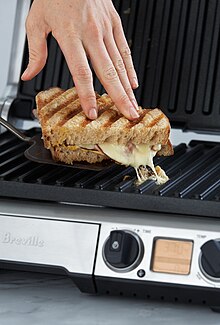Panino

A typical panini with salami, mortadella, tomatoes and lettuce
|
|
| Alternative names | Panini sandwich, panino, panino imbottito |
|---|---|
| Type | Sandwich |
| Place of origin | Italy |
| Serving temperature | Warm or room temperature |
| Main ingredients | Bread (not sliced bread), filling (salami, ham, cheese, mortadella) |
| |
|
| Panini grill | |
|---|---|

A sandwich being lifted off a panini grill
|
|
| Classification | Cooking equipment |
| Industry | Various |
| Application | Cooking |
| Fuel source | Electric |
In many English-speaking countries, a panini or panino (from the Italian panini [paˈniːni], meaning "small bread, bread rolls") is a grilled sandwich made from bread other than sliced bread.
Examples of bread types used for panini are baguette, ciabatta, and michetta. The bread is cut horizontally and filled with deli ingredients such as cheese, ham, mortadella, salami, or other food, and often served warm after having been pressed by a warming grill.
Panini is a word of Italian origin. In Italian the noun panino (Italian: [pa'ni:no]; plural panini) is a diminutive of pane ("bread") and literally refers to a bread roll. Panino imbottito ("stuffed panino") refers to a sandwich, but the word panino is also often used alone to indicate a sandwich in general. Similar to panino is tramezzino, a triangular or square sandwich made up of two slices of soft white bread with the crusts removed.
In English-speaking countries, panini is widely used as the singular form, with the plural form panini or paninis, though some speakers use singular panino and plural panini as in Italian.
Although the first U.S. reference to panini dates to 1956, and a precursor appeared in a 16th-century Italian cookbook, the sandwiches became trendy in Milanese bars, called paninoteche, in the 1970s and 1980s. Trendy U.S. restaurants, particularly in New York, began selling panini, whose popularity then spread to other U.S. cities, each producing distinctive variations of it.
...
Wikipedia
